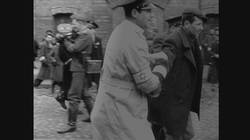Mary Cronk Farrell's Blog, page 25
November 15, 2010
Resist Temptation
Brooding about so-and-so-author-who-just- came-out-with-book-four-in-four-years kills any chance of worthwhile writing.
In a weak moment, googling this author and reading her blog might seem inspirational. Judging her books trash, acknowledging they do seem to be selling by the tens of thousands, convincing yourself that doesn't change their trash-status...
Hmmm. The adrenaline is flowing. Words might even be flowing across the page.
But more likely, you will be slumped over the keyboard feeling like your own writing is trash and you'll never finish another book.
Using the rush of feeling that comes from thinking about the success or failure of other authors to drive your own work may put words on the page in the short term. In the long term it results in shallow, contracted writing.
Word that speak deeply about the human condition flow from a self solid in its identity and purpose as if no other writer ever picked up a pen, or tapped keys on a keyboard.
In a weak moment, googling this author and reading her blog might seem inspirational. Judging her books trash, acknowledging they do seem to be selling by the tens of thousands, convincing yourself that doesn't change their trash-status...
Hmmm. The adrenaline is flowing. Words might even be flowing across the page.
But more likely, you will be slumped over the keyboard feeling like your own writing is trash and you'll never finish another book.
Using the rush of feeling that comes from thinking about the success or failure of other authors to drive your own work may put words on the page in the short term. In the long term it results in shallow, contracted writing.
Word that speak deeply about the human condition flow from a self solid in its identity and purpose as if no other writer ever picked up a pen, or tapped keys on a keyboard.
Published on November 15, 2010 07:53
November 12, 2010
It's art. It's chocolate. It's mine.
 Just so we're clear here. The drink referred to on this blog is Coffee.
Just so we're clear here. The drink referred to on this blog is Coffee.Mine, at home, do not look this pretty. But today I was out with my girlfriends.
This double mocha latte is courtesy of Kirk at Lindaman's. My husband and I have enjoyed this restaurant since before we were married in 1985. (In the interests of full disclosure, my youngest child is now a dishwasher here. He got the job himself, I had nothing to do with it. Actually, I had never even taken him her to eat.)
Possibly my favorite drink here is a caffee corretto known as the Triumvirate.
The hot drink contains espresso, bailey's, crème de menthe, kahlua, spiced chocolate and half n half. This is not a joke.
A Mexican, an Irishman and a Frenchman walked into a very busy Italian bistro. They proceeded to order what each described as their own country's finest coffee libation. Too busy to accommodate the attention to detail each drink required, the barista mingled three as one.
Straight off the menu. I kid you not.
Notice the first ingredient is espresso. So, yes. It qualifies as coffee.
Published on November 12, 2010 00:00
November 10, 2010
A Film Unfinished
Once I saw the trailer for A Film Unfinished, I knew I had to see it. Though horrified by the images of life in the Warsaw Ghetto in 1942, I wanted to know the truth.
Rarely, is the truth clear cut, as this film so aptly demonstrates.
After WWII, an unfinished Nazi propaganda film was discovered in a concrete vault. The silent hour-long rough cut portrayed life in the Warsaw Ghetto. Shot over 30 days, in May 1942 —just two months before the Nazis started sending the Ghetto's Jews to Treblinka—the film highlights extremes of poverty and luxury. Edits juxtapose scenes of people dying of starvation on the sidewalks with views of a fancy dinner party.
Shot over 30 days, in May 1942 —just two months before the Nazis started sending the Ghetto's Jews to Treblinka—the film highlights extremes of poverty and luxury. Edits juxtapose scenes of people dying of starvation on the sidewalks with views of a fancy dinner party.
For nearly half a century historians used the film as a record of life in the Warsaw Ghetto.
Then in a film vault at an American Airbase, a British researcher stumbled on two film cans lying on the floor titled "Das Ghetto". Inside—30-minutes of footage left on the cutting room floor when the Ghetto film was made. The outtakes clearly showed the film crew had staged many of the scenes. Some caught cameramen accidentally filming one another.
Tragically, the scenes of profound suffering and death are not the fakes. Face after face appears, eyes vacant, skin taut over bone. A fly buzzes and lands. A hand too weak to brush it off.
I want to look away, but I don't. I open myself to see each face that flashes on the screen as an individual human being. That man had a wife and children. That woman had plans and hopes, just like I do. That person never imagined his life would turn out like this.
I look at each skeletal body shown sliding down a chute into the mass grave. I make myself a witness to the human dignity of each one. Because that is an undeniable truth.
Rarely, is the truth clear cut, as this film so aptly demonstrates.
After WWII, an unfinished Nazi propaganda film was discovered in a concrete vault. The silent hour-long rough cut portrayed life in the Warsaw Ghetto.
 Shot over 30 days, in May 1942 —just two months before the Nazis started sending the Ghetto's Jews to Treblinka—the film highlights extremes of poverty and luxury. Edits juxtapose scenes of people dying of starvation on the sidewalks with views of a fancy dinner party.
Shot over 30 days, in May 1942 —just two months before the Nazis started sending the Ghetto's Jews to Treblinka—the film highlights extremes of poverty and luxury. Edits juxtapose scenes of people dying of starvation on the sidewalks with views of a fancy dinner party. For nearly half a century historians used the film as a record of life in the Warsaw Ghetto.
Then in a film vault at an American Airbase, a British researcher stumbled on two film cans lying on the floor titled "Das Ghetto". Inside—30-minutes of footage left on the cutting room floor when the Ghetto film was made. The outtakes clearly showed the film crew had staged many of the scenes. Some caught cameramen accidentally filming one another.
Tragically, the scenes of profound suffering and death are not the fakes. Face after face appears, eyes vacant, skin taut over bone. A fly buzzes and lands. A hand too weak to brush it off.
I want to look away, but I don't. I open myself to see each face that flashes on the screen as an individual human being. That man had a wife and children. That woman had plans and hopes, just like I do. That person never imagined his life would turn out like this.
I look at each skeletal body shown sliding down a chute into the mass grave. I make myself a witness to the human dignity of each one. Because that is an undeniable truth.
Published on November 10, 2010 09:44
November 8, 2010
Do You Trust the Reader?
An editor advised me to get rid of the rhetorical questions in my novel. So I changed them all to declarative statements.
No. He said that wasn't good enough. I really had to get rid of them.
"But will the reader understand what I'm trying to say?" I asked. After all we were talking about my all-important climax scene. My main character was weighing her options, deciding a question that would set the direction for her life.
"You're asking the wrong question," said the editor. "You must trust yourself. And you must trust your reader."
My rhetorical questions signaled my insecurity—Demon # 164.
To write well, I must believe in myself. Pounding the reader over the head with sentences explaining what I want my reader to "get" is a sure sign that I do not trust my storytelling.
Have I laid the foundation for the reader to understand my character's predicament? Have I written a story with emotional depth? These are scary questions to face after working years on a novel. But they must be asked.
If I have accomplished these crucial tasks, it does not matter if readers "get" what I'm trying to say. Readers bring their own lives to the novels they read. They get what they need to get.
If I have not done the groundwork, if I have not written a story that thrums with authentic human emotion, no amount of rhetorical questions will do it for me. If I have written a beautiful story that rings with the universal truth of the human experience, rhetorical questions and similar techniques that hammer information like a ten penny nail will confuse, rather than enlighten, the reader.
No. He said that wasn't good enough. I really had to get rid of them.
"But will the reader understand what I'm trying to say?" I asked. After all we were talking about my all-important climax scene. My main character was weighing her options, deciding a question that would set the direction for her life.
"You're asking the wrong question," said the editor. "You must trust yourself. And you must trust your reader."
My rhetorical questions signaled my insecurity—Demon # 164.
To write well, I must believe in myself. Pounding the reader over the head with sentences explaining what I want my reader to "get" is a sure sign that I do not trust my storytelling.
Have I laid the foundation for the reader to understand my character's predicament? Have I written a story with emotional depth? These are scary questions to face after working years on a novel. But they must be asked.
If I have accomplished these crucial tasks, it does not matter if readers "get" what I'm trying to say. Readers bring their own lives to the novels they read. They get what they need to get.
If I have not done the groundwork, if I have not written a story that thrums with authentic human emotion, no amount of rhetorical questions will do it for me. If I have written a beautiful story that rings with the universal truth of the human experience, rhetorical questions and similar techniques that hammer information like a ten penny nail will confuse, rather than enlighten, the reader.
Published on November 08, 2010 07:56
November 5, 2010
O World, I cannot hold thee close enough!
 Outside my window My part of the world is glorious! The weather this first week of November could fool me into thinking it's early October. It's sunny, and warm enough to run without sleeves. All I want to do is walk through the neighborhood and look. Look at every single leaf. Run and laugh and gaze with wonder at the blue sky. Does anyone say it better than Edna St Vincent Millay?
Outside my window My part of the world is glorious! The weather this first week of November could fool me into thinking it's early October. It's sunny, and warm enough to run without sleeves. All I want to do is walk through the neighborhood and look. Look at every single leaf. Run and laugh and gaze with wonder at the blue sky. Does anyone say it better than Edna St Vincent Millay?O world, I cannot hold thee close enough!
…Thy woods, this autumn day,
…all but cry with colour!
…Lord I do fear
Thou'st made the world too beautiful this year.

 My November Raspberries
My November Raspberries
Published on November 05, 2010 01:00
November 1, 2010
Demon Checklist
Checklists help us get things in order. They're a means of managing, staying in control. Or, at least, they prop up that illusion. But we have to start where we are, so if a checklist is what we've got to work with—start checking. Recognize any of these demons?
□ Procrastination
□ Doubt
□ Writers' block
□ Fear of failure
□ Fear of success
□ Loneliness
□ Fatigue
□ Self-criticism
□ Rejection
□ Despair
If you have all or many of these, often on a daily basis, what does it mean?
It means you're a writer. It doesn't mean you're crazy, a loser or doomed forever.
If you worked as an accountant, computer engineer or teacher you might wake up Monday morning with some of these feelings, but you would brush your teeth, get dressed and go to work as usual. You'd put these negative feelings and behaviors aside and do what you're supposed to do.
But when you're a writer and these demons come, it a whole different story. Try putting them aside, chasing them away or pretending they don't exist and you'll never write anything of consequence.
Trouble is, most of us have never been taught to invite the demons in for a latte. There is no class in high school titled Learn Not to Deny and Stuff Emotion or Be Your True Self Even If People Don't Like You.
For many of us, high school was a training ground for Denying and Stuffing Emotion 101. We learned, probably even before we went to school How to Hide Our True Selves So We Don't Get Hurt.
But it's a writer's job to bring emotion to life on the page. If we want to write with any sense of truth, we need to experience our full range of feelings.
You could start now. Recognize what you're feeling at this moment. Notice and possibly name it.
□ Procrastination
□ Doubt
□ Writers' block
□ Fear of failure
□ Fear of success
□ Loneliness
□ Fatigue
□ Self-criticism
□ Rejection
□ Despair
If you have all or many of these, often on a daily basis, what does it mean?
It means you're a writer. It doesn't mean you're crazy, a loser or doomed forever.
If you worked as an accountant, computer engineer or teacher you might wake up Monday morning with some of these feelings, but you would brush your teeth, get dressed and go to work as usual. You'd put these negative feelings and behaviors aside and do what you're supposed to do.
But when you're a writer and these demons come, it a whole different story. Try putting them aside, chasing them away or pretending they don't exist and you'll never write anything of consequence.
Trouble is, most of us have never been taught to invite the demons in for a latte. There is no class in high school titled Learn Not to Deny and Stuff Emotion or Be Your True Self Even If People Don't Like You.
For many of us, high school was a training ground for Denying and Stuffing Emotion 101. We learned, probably even before we went to school How to Hide Our True Selves So We Don't Get Hurt.
But it's a writer's job to bring emotion to life on the page. If we want to write with any sense of truth, we need to experience our full range of feelings.
You could start now. Recognize what you're feeling at this moment. Notice and possibly name it.
Published on November 01, 2010 08:25
October 29, 2010
Eat, Drink & be Mary
One way I enjoy the fruits of summer into the fall is to pick my green tomatoes and bring them inside to ripen. They still have much better flavor than a tomato you buy at the store. My favorite way to eat them is Margarita Pizza. My autumn recipe uses pesto rather than fresh basil.  Spread pesto to cover the whole wheat crust. Cover with shredded mozzarella cheese, place slices of tomato on top.
Spread pesto to cover the whole wheat crust. Cover with shredded mozzarella cheese, place slices of tomato on top.
 I usually make two because I have a teenage son, and I love the leftovers reheated for lunch the next day.
I usually make two because I have a teenage son, and I love the leftovers reheated for lunch the next day.
 Spread pesto to cover the whole wheat crust. Cover with shredded mozzarella cheese, place slices of tomato on top.
Spread pesto to cover the whole wheat crust. Cover with shredded mozzarella cheese, place slices of tomato on top.  I usually make two because I have a teenage son, and I love the leftovers reheated for lunch the next day.
I usually make two because I have a teenage son, and I love the leftovers reheated for lunch the next day.
Published on October 29, 2010 13:41
October 27, 2010
Literature & History
I can't wait to get my hands on the newly released second book in Y S Lee's
Agency
series,
The Body at the Tower.
This time Mary Quinn investigates murder while disguised as a boy, a poor apprentice builder assigned to a building site on the clock tower of the Houses of Parliament.
Lee, with her PhD in Victorian literature and culture, gives us a suspenseful and resonant glimpse of a fascinating moment in history. According to Kirkus Reviews "…the sights, smells and grim lives of London's poor are richly detailed…."
Though Mary and the clandestine Agency operating out of Miss Scrimshaw's Academy for Girls are unrealistic to the time period, they provide a terrific story against a backdrop of accurate and interesting history. I was hooked on Lee's first book A Spy in the House , when Mary goes undercover during London's Great Stink of 1858. A smelly situation that really happened. Says Lee,
"It was a particularly warm year and the smell from the grossly polluted Thames became, quite suddenly, unbearable. People panicked. Those who could fled London for the country. And the Great Stink finally pushed the government into cleaning up the Thames and modernizing London's sewer system.
We know the bare facts: toilets flushed right into the Thames, and Londoners pumped the water straight back out for cooking and bathing. People thought the smell made you sick – not germs. And future prime minister Benjamin Disraeli fled the House of Commons one day with a handkerchief over his nose, so evil was the stench."
Ah! Those were the good ol' days.
 Lee plans to unveil the cover of yet a third Mary Quinn detective story soon. I'm hoping it won't be the last. And not just because I won this tee at the twitter book launch of #2. Thanks, Ying!
Lee plans to unveil the cover of yet a third Mary Quinn detective story soon. I'm hoping it won't be the last. And not just because I won this tee at the twitter book launch of #2. Thanks, Ying!
Lee, with her PhD in Victorian literature and culture, gives us a suspenseful and resonant glimpse of a fascinating moment in history. According to Kirkus Reviews "…the sights, smells and grim lives of London's poor are richly detailed…."
Though Mary and the clandestine Agency operating out of Miss Scrimshaw's Academy for Girls are unrealistic to the time period, they provide a terrific story against a backdrop of accurate and interesting history. I was hooked on Lee's first book A Spy in the House , when Mary goes undercover during London's Great Stink of 1858. A smelly situation that really happened. Says Lee,
"It was a particularly warm year and the smell from the grossly polluted Thames became, quite suddenly, unbearable. People panicked. Those who could fled London for the country. And the Great Stink finally pushed the government into cleaning up the Thames and modernizing London's sewer system.
We know the bare facts: toilets flushed right into the Thames, and Londoners pumped the water straight back out for cooking and bathing. People thought the smell made you sick – not germs. And future prime minister Benjamin Disraeli fled the House of Commons one day with a handkerchief over his nose, so evil was the stench."
Ah! Those were the good ol' days.
 Lee plans to unveil the cover of yet a third Mary Quinn detective story soon. I'm hoping it won't be the last. And not just because I won this tee at the twitter book launch of #2. Thanks, Ying!
Lee plans to unveil the cover of yet a third Mary Quinn detective story soon. I'm hoping it won't be the last. And not just because I won this tee at the twitter book launch of #2. Thanks, Ying!
Published on October 27, 2010 01:00
October 25, 2010
Dealing With Demons and other Dark Holes of the Writing Life
This morning I woke up in a bad mood. Part of me rebelled against my morning routine of practicing yoga and meditation, rebelled against writing. Rebelled against even getting out of bed. But I had to drive my husband to the airport, so I got up.
Whenever the rebellious Mary pokes her head up, the judging Mary is never far behind. Before I am even concious of it, I condemn myself for not doing the things I should do, the things I want to do, the things that help make me my best self.
So, I sit in my favorite feeling bad for myself corner of the couch with my coffee and try to figure out what's wrong. Here's where I make the crucial choice. I sometimes continue down the path of questions like—What's wrong with me? Why do I have such a hard time following through with things that are important to me?
This morning, the sadness and disappointment well up. I let them come. I don't swallow the lump in my throat. I don't ask questions of myself. I feel. I feel the weight in my shoulders, the pressure on my chest.
My agent submitted my book proposal ten days ago. I ignore the voice that says, "You expected an editor to just snap it up? You thought it was that good? Are you crazy, or stupid?
No, I'm not crazy. I'm not stupid. Yes. I thought it was that good. If I didn't think it was that good, I wouldn not have spent the last three months of my life putting my heart, soul and time into researching and writing it.
I admit it. I'm disappointed. It hurts. The emotion washes through me.
Before I know it, I'm up from the couch. My bad mood is gone. The day stretches before me like a blank page. I don't know what will be written, but it will be written well.
Whenever the rebellious Mary pokes her head up, the judging Mary is never far behind. Before I am even concious of it, I condemn myself for not doing the things I should do, the things I want to do, the things that help make me my best self.
So, I sit in my favorite feeling bad for myself corner of the couch with my coffee and try to figure out what's wrong. Here's where I make the crucial choice. I sometimes continue down the path of questions like—What's wrong with me? Why do I have such a hard time following through with things that are important to me?
This morning, the sadness and disappointment well up. I let them come. I don't swallow the lump in my throat. I don't ask questions of myself. I feel. I feel the weight in my shoulders, the pressure on my chest.
My agent submitted my book proposal ten days ago. I ignore the voice that says, "You expected an editor to just snap it up? You thought it was that good? Are you crazy, or stupid?
No, I'm not crazy. I'm not stupid. Yes. I thought it was that good. If I didn't think it was that good, I wouldn not have spent the last three months of my life putting my heart, soul and time into researching and writing it.
I admit it. I'm disappointed. It hurts. The emotion washes through me.
Before I know it, I'm up from the couch. My bad mood is gone. The day stretches before me like a blank page. I don't know what will be written, but it will be written well.
Published on October 25, 2010 01:00



